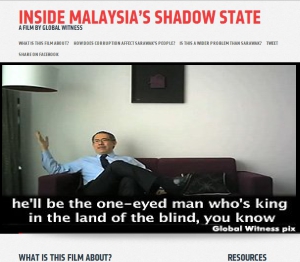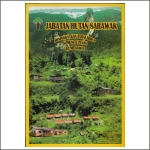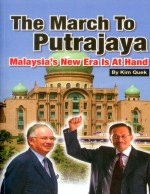 By Apang
By Apang
This piece is going to be a hard one. This is because Sarawak is the general context for this analysis, with rural Sarawak the particular focus, along with an examination of the various key factors working against the people and their aspirations.
Notice I am not saying these factors work against the opposition Pakatan Rakyat, for one simple reason – it will not be the opposition or the government who wins or loses in any election, but it will be the people of Sarawak whose future is at stake.
For those who know the socio-economic, physical, political and legal context of rural Sarawak, perhaps this knowledge is the first clue to what not to expect in the upcoming Sarawak elections. No, I am not a pessimist, but a realist, endowed with limited knowledge. True, I have only been to some small parts of the vast reaches of rural Sarawak, but it is not hard for me to identify the inhibiting factors working against the people. So I am able to offer some generalisations, but also certain specific observations.
To most Malaysians, including urban Sarawakians, the word “rural” is synonymous with the absence of infrastructure, amenities, and other facilities that urban Malaysians have long taken for granted. In economic terms, things are hard to come by. If and when things are at hand, the prices are astronomical.
 I still remember when the price of petrol in towns was around RM2.70 per litre. At that time, rural Sarawak was already paying many times that amount. If you go now to rural communities, you will find that even with the purported fuel transport subsidy, the price of petrol there is still many times higher than in urban Malaysia.
I still remember when the price of petrol in towns was around RM2.70 per litre. At that time, rural Sarawak was already paying many times that amount. If you go now to rural communities, you will find that even with the purported fuel transport subsidy, the price of petrol there is still many times higher than in urban Malaysia.
Constituencies accessed only by logging roads
My limited personal knowledge prevents me from generalising about all of rural Sarawak, but I can make specific observations which shed light on general realities.
I am going to zoom in on those parts of rural Sarawak where logging roads have replaced waterways and jungle-trekking as the main modes of transport. On these logging roads, land transports or 4×4 vehicles owned by companies and private operators dominate, and often monopolise, the movement of people and goods.
In remote Belaga, or Baram, or Ulu Kapit (three areas which encompass three parliamentary seats and at least five or six state assembly seats), 4×4 vehicles provide the only means of moving around. Even in villages where people and goods can be transported by river to a certain extent, petrol is super expensive.
Taken together, the monopolies of 4×4 vehicles and the exorbitant cost of boat fuel restrict registered voters from shuttling between their homes and the few polling stations in these areas. Each voter will have to scrape together at least a hundred ringgit, just to travel to vote and return home.
This sum of money is extremely hard to come by, and is reserved mostly for critical needs, like going to and from clinics, moving kids to and from schools and other daily demands of real life. Under such circumstances, those registered voters who want change are not likely to get to vote for it.
Polling stations few and far in between
As if the real hardship of poverty, and the much publicised lack of Identity Cards (ICs) among Sarawakians (who are thus unable to register as voters) are not enough, voters have to contend with the unfair conduct of the election process in rural Sarawak.
 The Election Commission (EC) will, as always, boast of its costly rural effort: chartering helicopters and moving people, ballot boxes and papers on boats and vehicles. The EC will try to showpiece the money spent on elections. But what the EC declines to show is the countless number of rural people who will not be able to vote even if they want to, because the cost of going to vote is either prohibitive, or because there is just no transport available.
The Election Commission (EC) will, as always, boast of its costly rural effort: chartering helicopters and moving people, ballot boxes and papers on boats and vehicles. The EC will try to showpiece the money spent on elections. But what the EC declines to show is the countless number of rural people who will not be able to vote even if they want to, because the cost of going to vote is either prohibitive, or because there is just no transport available.
Like all things Malaysian, such centralised decision-making and implementation are only workable in places with easy access. We see this model does not work in education and health, as proven by the outdated planning strategy of building a school and clinic to serve a widely dispersed group of villages.
The authorities even blame the villagers for staying too far apart, in areas that are too remote. (But in the context of 47 years of Malaysian history, such outmoded reasoning is simply another sign of a failed government that does not deserve to be in office at all!) In the conduct of rural elections, we see how this reasoning denies voters their rights to cast their votes.
How loggers make or break governments
Increasing numbers of remote Penan, Kenyah, Kayan, Kelabit and other communities are taking loggers, plantation companies and the state government to court over their loss of land rights and their livelihood. These villages are easily targeted as “anti-government”, that is, anti-BN to be exact.
It is not difficult to see how these villages are marked out for various forms of punishment, ranging from their headmen being deprived of recognition and government allowances, to the denial of these villages’ rights to development. Come election time, there will be no “free” transport to move these villagers to the polling stations to exercise their rights to vote.
Logging vehicles will not be available to transport those villagers identified as anti-BN. Even worse, the few vehicles owned privately by villagers will be “bought over” to deny any non-BN candidate or opposition party access to transport, to move voters to polling stations which are not served by helicopters.
But this is not the only role the loggers will play. Just as the loggers work with BN candidates to identify “anti-BN” villages to be denied transport, those villages identified as “pro-BN” will be provided with free transport to and from the voting stations. While in the vehicles, it is not hard for anyone to speculate what else can transpire.
We have seen recent efforts by NGOs and concerned individuals to register rural voters, and to follow up with the authorities to ensure the speedy provision of birth certificates and ICs. These efforts, while laudable, will be only the first step on the long road to free and fair elections in rural Sarawak.






















Who said the people in Sarawak still need Taib services.The word come from his own cronies….better for you to before others push u out like Mahathir before.
Comment by Pandak segatak — August 26, 2010 @ 3:40 PM |
BN is the only government that Sarawak has ever known since it forms Malaysia together with Sabah and Malaya. BN is the only government capable of transforming the people especially in the rural interiors BUT not into a progressive, forward thinking, competitive and deligent populace but subservient and rent seeking. That is the most visible achievement of UMNO controlled BN. UMNO and BN have nothing new to win over the hearts and minds of Malaysians as it continues to employ government machinery, media and electoral manipulation, and lots of money to buy votes to win in an election.
Pakatan is duty bound to educate the rural electorates of their voting and citizenship rights and their rights to ownership claims of NCR lands and full development programmes expected of the government of the day. It is the responsibility of the government, be it BN or PR to take care of the welfare of all Malaysians living in the cities or remote parts of the country.
All NCR landowners whose lands have been taken away and given to some corporations to develop should take the coming Sibu by-election as an opportunity to unite in strength to gather in Sibu to register their strongest displeasure and protest on nomination day to highlight their plights and grievances. All concerned citizens and NGOs should lend a helping hand to transport these helpless landowners from all over Sarawak to Sibu before nomination day. We hope Najib, and his cabinet leaders will be there too to see for themselves and know the truth.
The time is now for the Dayaks to revolt in their hearts and demand justice and a systematic socio-economic developments to be carried out in all rural constituencies.
Comment by Mata Kuching — April 25, 2010 @ 8:01 PM |
No one will deny PR will have an uphill task to win in rural Sarawak.
Likewise no one expected the tsunami of March 8 2008 General Election.
Let’s do our best to help.
Those with transport, please help to ferry the voters to the polling station.
Those who are far away, pray for reform, a fair election and just state government.
Comment by PH Chin — April 22, 2010 @ 1:05 PM |
destruction of land and disunity among rural communities/villagers…rather thne deveplopment…..
example….Shin Yang been logging in Long lellang for the nearly 20 years…..i.e. this year is the 3rd and some 4th time they logged the Coupe(Area)……but to-date nothing sustainable/so-called development brought by this loggers…..who’s nearly 80% of the workers are illegal Indonesian!
The dirt track from Sungai Akah to Long Lellang was constructed by the company who upgraded the Long Lellang airport terminal and runway…..to bring in their machineries!
secondly…..Samling in bario area especially in central Kelapang area…..since they move out….road inthese area were hard maintained.
Comment by fe — April 22, 2010 @ 12:58 PM |
Well if what’re told are all true then what is there to say that BN government is caring or democratic. What type of human beings r these people even during the election the local rural people are deprived from using transportation to reach to the polling stations to exercise the right to vote their choice of representative. This reflects the Malaysian BN government is very undemocratic. May I call all Malaysian Sarawakians to deny this BN the right to govern the state of Sarawak comes PRN10 by Denying Supp/BN the Sibu parlimentary by-election on 16.05.2010. Make sure that DAP/PR candidate will win the by-election n from there on we will ensure will give the PR a chance to win the PRN10 state election to form the next state government. Try them for a term n if they can deliver better than BN then we make sure they continue or else if they don’t we always can reject them comes PRN11. I don’t see any reason why we cannot do that if we can suffer for the last 48 years being neglected and deprived from our right. Have a go…go…go…go Sarawakians. We have our right…our right…our right….our right. U PBB/BN have no right to deprive us form that right. Go to hell with PBB/BN and same to taib, d’ corrupted n najib, d’ najis. Hidup Pakatan Rakyat. Teruskan perjuangan. Kini kami Sarawakian sudah sedar…sudah sedar…sudah sedar. Kita mula dgn sibu dan selepas itu kita kalahkan PBB/BN Sarawak pd PRN10. Agi idup agi negelaban.
Comment by Minda Mandol — April 22, 2010 @ 12:45 PM |
I’ve seen for myself, logging company 4WD pick-up trucks flying BN flags, full of poor villagers who have no other way of getting to voting stations. You can argue that they should take the money and the free transport and still vote against BN, but the pressure on them is enormous.
Comment by Pak Bui — April 22, 2010 @ 1:00 AM |
However, those marked as anti-BN villages will not even have any vehicle waiting so even if the villagers wanted to take their money and vote against BN, it would still not be possible.
Imagine, rights to vote is not exercisable because there is no transport!
Comment by ah pek — April 22, 2010 @ 2:45 AM |